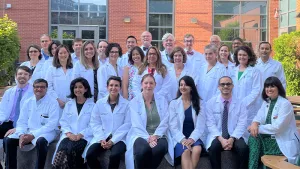Training in the breadth and depth of outpatient infectious disease is an integral part of the fellowship and is achieved through fellow continuity clinic, travel clinic, and in specialty clinics at other hospitals during inpatient rotations.
Fellow Continuity Clinic at Tufts Medical Center
All fellows establish a weekly continuity clinic at the Tufts Medical Center Infectious Disease Center in which they follow their own panel of patients for the entirety of their fellowship, with supervision by attending infectious disease physicians. Fellows gain experience in the management of HIV disease as both a primary care provider and a consultant. In addition, fellows provide consultation on the entire spectrum of outpatient infectious disease, including pre-transplant infectious disease evaluations, long-term outpatient antibiotic therapy, Lyme disease, and sexually transmitted diseases.
Continuity Clinic Curriculum
Travel Medicine Clinic at Tufts Medical Center
An important aspect of Tufts Medical Center infectious disease training is the opportunity to provide pre-travel counseling and vaccines as well as management of the returning ill traveler. Fellows are supervised by infectious disease physicians with additional certification in travel medicine.
Travel Medicine Clinic Curriculum
Partner Hospital Specialty Clinics
Lahey Clinic Medical Center
The ID Fellow experience offered at the Lahey Clinic in Burlington nicely complements that of Tufts. It combines exposure to the more community-hospital type of ID experience with different elements of specialty medicine. For example many patients with tick-borne infections are seen during the summer months, and the full spectrum of anaplasma/babesia/lyme and diagnostic & management challenges of these can be seen. The Lahey Urology service is very large and handles complex urologic patients from a wide catchment area. Around 2009 liver transplant services at Tufts were suspended and most of these patients were transferred to the Lahey for ongoing care, where there is still a very active service. The Lahey Clinic is also one of the pioneers in offering percutaneous aortic and mitral valvular interventions. Many patients from these groups of patients require inpatient ID consultation for a variety of reasons. The monthly leprosy clinic is another fantastic learning opportunity for ID fellows to attend. A smaller group of mostly clinical ID attendings allows the ID consult service at the Lahey to run as an extremely efficient, well-oiled machine with the fellow focusing mainly on seeing as many new consults as possible, with many of the follow-ups being taken care of by the attendings. This exposes fellows to a wide breadth of patients and is excellent clinical training.
Lahey Clinic Curriculum
Lemuel Shattuck Hospital
Rotating to the Lemuel Shattuck Hospital (“The Shattuck”) is a unique experience for ID fellows which offers great training opportunities. As a State-run hospital, many patients are sent from all over Massachusetts for treatment of serious infections requiring extended courses of antibiotics. Fellows are exposed to the whole spectrum of serious staphylococcal and other bloodstream infections and the complications that can occur during therapy. There are many cases of endocarditis from a variety of bacteria and fungi. A lot of these are associated with intravenous drug use and dealing with this in combination with the medical problems is a difficult challenge. Historically the Shattuck has been a focus of HIV care in Boston, and this continues today with dedicated HIV inpatient and outpatient services. Many of these patients are complex and grappling with the medical and social consequences of long-standing HIV infection and various infectious and non-infectious comorbidities. Many cases of tuberculosis (including multidrug-resistant TB) are still managed in the inpatient setting then followed up via the TB clinic. The patients (and staff!) are from a diverse array of social/cultural/geographic/economic backgrounds and this enriches the fellow experience.
Lemuel Shattuck Curriculum
